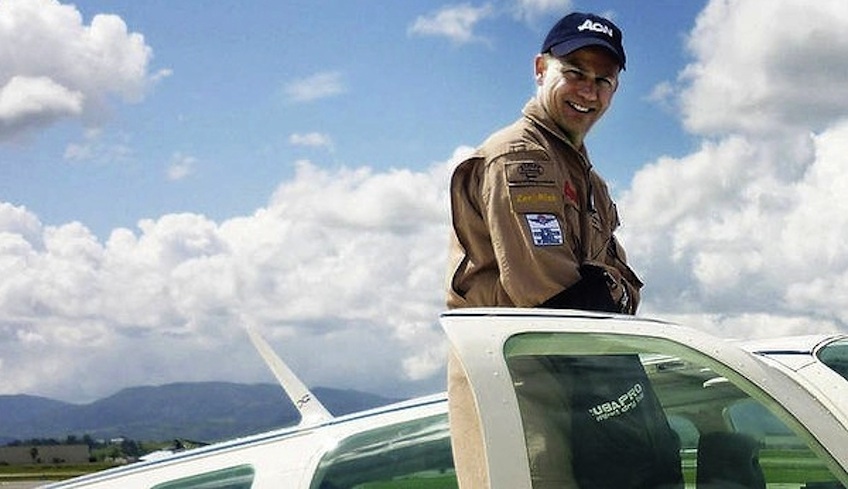Move over Flight of the Bumblebee. Hello Flight of the Butter Tubs.
That’s what you could call the daring 12,000 mile journey that Australian pilot Jeremy Rowsell is planning for early next year, when he will fly a single engine plane from Sydney to London on fuel that’s neither gasoline, kerosene nor any other traditional aircraft propellant.
Oh, it must be aviation biofuel? Or perhaps it’s some of that discarded cooking oil that has given lift to a few recent aerial stunts?
Wrong!
Rowsell and his partners are cooking up 4,000 liters of liquid energy by melting down discarded plastic – the same sort of drifting, wayward, household rubbish that the adventurous 41-year-old transoceanic pilot spots all too often accumulating in the Pacific.
“You look down at that garbage in the Pacific, and you see the result of what it’s doing,” says Rowsell, referring to the ecological scourge that is killing animals that ingest it, entangling others, and attracting toxins into the food chain. “I’m doing this because I believe that unless we do something to give back to the planet, we’re stuffed.”
Irish stoutRowsell won’t actually make the fuel himself. That’s the job of Cynar plc, a Dublin, Ireland company that will convert the plastic into aviation grade diesel using an oxygen-free process called pyrolysis. But Rowsell’s team has scooped up actual Pacific plastic and sent it Cynar for processing.
The idea is to prove that aviation does not have to continue relying on its traditional CO2-emitting fossil fuels, and at the same time, it can diminish the world’s suffocating plastic problem.
The adventurous flight won’t mark the first single engine journey from Australia to the UK, but it would certainly be the first such journey using the novel fuel.
Rowsell, a dual British/Australian citizen, takes inspiration from his aviator heroes of the 1920s and 30s: Australians like Charles Kingsford Smith who in 1928 made the world’s first U.S.-to-Australia trans-Pacific journey; and Bert Hinkler, who flew the first solo flight from England to Australia, also in 1928.
“These guys were pioneers in their day using the airplane to show people how they could change the world,” he says. “What we’re doing is using airplanes to show that a fuel, made from plastics, can change our world.”
Globe hopping
As with any pioneer, there’s plenty of uncertainty surrounding the journey. Cynar has needed some extra time to process the fuel – which it also makes for other purposes – into aviation grade.
And since hatching its idea in a Sydney pub last March, the team has already had to change its choice of aircraft. It originally planned to use a Cessna 182, but decided to switch to a smaller Cessna 172. One reason: the 182 could not easily accommodate the diesel engine.
The 172’s engine can run on either conventional aviation gasoline (“avgas”) or the Cynar plastic. But because it cannot carry as much fuel as the 182, Rowsell will have to make more stops than called for in an original six-day itinerary. He says he hopes to complete the adventure in “less than two weeks” flying about 1,000 miles a day from dawn to dusk at around 5,000 feet.
The exact route has yet to be determined. The original plan involved touching down in Darwin, Christmas Island, Sri Lanka, Oman, Jordan and Malta. The modified manifest is likely to include those stops and others as Rowsell winds his way over Indonesia, Singapore, Thailand, Burma, Bangladesh, India, Saudi Arabia and Europe.
“I’ll probably try to duck some of the mountains – the south of France will be nice that time of year,” Rowsell says as he sketches out the final stops that could also include Crete or Rhodes.
Part of the challenge of the $1.4 million undertaking will be assuring that there is fuel waiting on the ground, and arranging bureaucratic approvals and clearances of landings and takeoffs.
Survival of the sleeplessThose are the logistical hurdles. Then there are the flat out hazards. Rowsell, a married father of two boys, knows how his aviator heroes perished. Hinkler crashed in the mountains of Italy in 1933, and Kingsford Smith disappeared in the sea on a flight from India to Singapore in 1935.
“If the engine stops, you know it’s all over,” he matter-of-factly points out.
He’s not taking the risks lightly. Rowsell, who ironically works a day job as an insurance industry executive, has pushed himself to the breaking point with pre-trip survival courses.
The Australian firm Red Alert has had him escape from a submerged aircraft.
Another training company, ZeroRisk International, kidnapped him for 3 days after he returned to Sydney from a sleepless long haul flight, threw him gagged, bound and hooded into the back of a 4×4, and sent him to the Australian bush where he skinned rabbits for food. Before seeing Sydney again, he had to scuba dive and paddle a canoe through waters that ZeroRisk boss Tony Loughran describes as “well patrolled by bull sharks.”
“He’s a resolute character, mate,” says Loughran. “He’s very, very robust.”
That also describes Rowsell’s determination to attack the global plastic crisis.
Originally appeared on Ecomagination, October 11, 2012





Comments